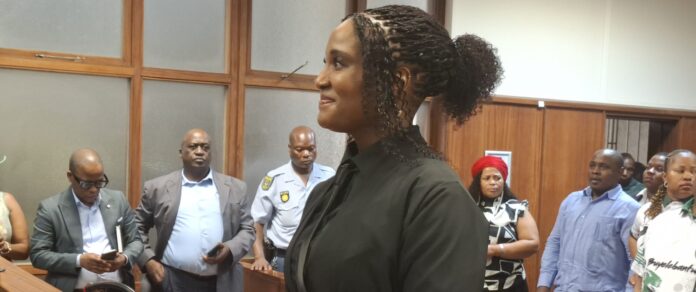The complainant, whose case with the South African Police Service resulted in Duduzile Zuma-Sambudla being charged for allegedly inciting violence during the unrest in July 2021, has acknowledged that her “we see you” was not encouraging rioting or looting.
The admission was made by Sarah-Jane Trent, a former Paul O’Sullivan employee, on the third day of the trial at the KwaZulu-Natal Durban High Court.
Advocate Dali Mpofu, the senior counsel, was cross-examining Trent after state prosecutor Advocate Yuri Gangai had led her testimony.
She reaffirmed time and time again that saying “we see you” does not incite violence. “That’s correct,” Trent said repeatedly.
Zuma-Sambudla and the Umkhonto Wesizwe party members in the courtroom continued to smile as the witness made the admissions.
Catalyst for the July 2021 unrest
Additionally, after seeing one of the videos that was submitted as proof of violence during the July 2021 unrest, Trent acknowledged that the phrase “we see you” does not depict violence.
The former president Jacob Zuma’s imprisonment after the Constitutional Court sentenced him to 15 months in prison for not testifying fully before the Zondo commission, which was looking into claims of state capture during his presidency, was the catalyst for the unrest.
Zuma-Sambudla mentioned that “we see you” in a number of locations, including Ladysmith, Ntuzuma, and Richards Bay.
There was extensive property burning and looting in these areas.
Later, Mpofu pulled out a CV (curriculum vitae) of Trent, which indicated that she is a qualified fraud examiner.
When Mpofu asked her why she had included the CV, she replied that the investigators had requested it and she didn’t know why.
Mpofu said she ought to have questioned the investigators about the necessity of her CV. Trent then admitted that she was “not objective” in the case, as she was the complainant.
Credibility of witness questioned
Mpofu then told her that he was going to argue that she is not a credible witness.
“I am going to argue in the end that your quality as a witness is very, very poor, in my extensive experience. Any comments? Mpofu asked.
“That’s your opinion,” she replied.
Mpofu continued: “I am also going to argue that you evade questions, especially when they come closer to the bone.” But Trent disagreed.
“I am also going to argue that all your statements, put together, are not worth the paper they are written on because when we interrogate them, whether individually or cumulatively, they come to zero.”
Again, Trent disagreed.
The case continues with the state expected to call in more witnesses to bolster its case, which so far appears to be weak, uncoordinated, and unable to place Zuma-Sambudla at the centre of directly inciting people to engage in violence and looting.



